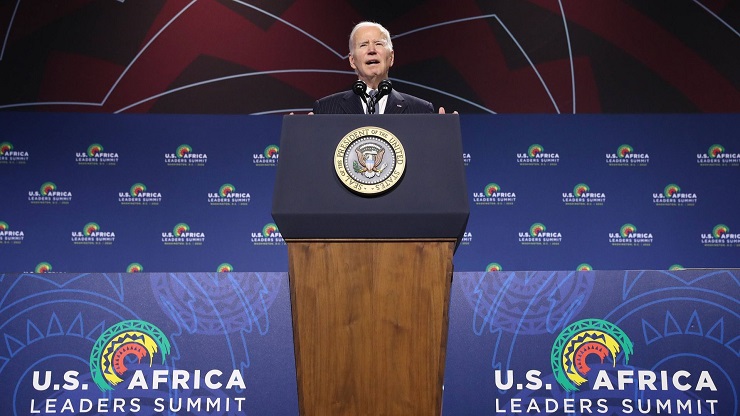
There is hardly any doubt that the African continent holds immense political and economic significance for the people of the continent and for extra-regional states. It is rich in natural resources and will have one quarter of the world’s population by 2050. But within a global context marked by extremely heightened tensions, including threats of major military conflicts in Europe and Asia between superpowers, Africa’s fate hangs in the balance. A lot of the trouble the world is facing today has to do with the fact that the global political system created post Second World War and unilaterally dominated by the US since the end of the Cold War is in sharp decline. On the one hand, China’s massive economic rise is threatening the US dominance, and on the other hand, the blow Western military supremacy has received in Ukraine has exposed the limits of its power, leaving open the question of Washington’s reliability as Africa’s partner.
Africa, therefore, is skeptical of the extent of its engagement with the US for so many reasons. First of all, it is skeptical because its entire engagement with Africa is driven, first and foremost, by the imperative of countering the rising influence of China and Russia. Indeed, the US made its intentions pretty clear when it declared in its August-2022 Africa strategy document that its purpose is to respond to “foreign activity” – specifically, Russian and Chinese presence – in Africa. If all that Washington is seeking to achieve is pushback Russia and China, it means that its whole narrative of engagement with Africa is only a secondary purpose. In other words, Africa happens to be important for Washington not because Africa is an important continent in its own sense but because Washington sees it as a region that must be under its control so that it can shape it in its image.
This China-Russia centric importance of Africa for Washington was/is evident in the latest visit of Janet Yellen, the US Treasury Secretary. The visit, as irony would have it, came only days after the official visits of Russia and Chinese officials. Not only that, Yellen also warned Africa of the threat that “shiny deals” with China pose to the continent. But the visit, as usual, seemed to offer too little and too late in terms of pushing Russia and China back. During Lavrov’s visit, South Africa – which happens to be among countries that abstained from voting against Russia in the UN after Moscow began its special military operations in Ukraine in February 2022 – announced to host a joint naval exercise with Russia and China between February 17 and 27.
For many in the US, there are three troubles in this announcement. First is the fact that South Africa is deepening its ties with both of the US’ biggest global rivals. It leaves minimum space for Washington to maneuver to achieve the objectives it outlined in the August-2022 policy document.
Secondly, the timing of this naval exercise is also crucial. That it coincides with the 1st anniversary of Russia’s special military operation in Ukraine means that the Russian narrative on Ukraine i.e., the crisis is driven by the US-sponsored expansion of NATO targeted at Russia, remains valid. Its validity means that Washington’s portrayal of Russia as a country that views the “views the [Africa] region as a permissive environment for parastatals and private military companies, often fomenting instability for strategic and financial benefit” has so far failed to make any impact whatsoever.
One may argue that South Africa is a member of the BRICS and has kind of ties with Russia that other countries may not have. In this context, its extensive military engagement with and diplomatic support for Russia make sense. But Russia’s presence in Africa goes well beyond South Africa only.
For instance, Russian supplies of energy to Africa have increased and are likely to continue to rise in the wake of EU sanctions. As reports in the western media show, Russia could supply 370,000 tons of diesel only this month to Africa. Since the start of January, diesel and gasoil supplies from the Russian Black Sea port of Novorossiisk to Senegal have ramped up to 140,000 tons versus 35,000 tons in the previous month. None of this certainly bodes well for Washington’s policy of ‘containing’ Russia. Most importantly, the fact that Africa is buying energy from Russia means that the continent is openly defying the US policy of strangulating the Russian economy via sanctions.
As far as China is concerned, its trade with Africa, despite Washington’s characterization of Beijing as harmful for Africa, stood at US$254 billion in 2021, exceeding by a factor of four U.S.-Africa trade. There is, therefore, no match.
Thirdly, the fact that Africa continues to develop ties with Russia (and China) shows that Washington’s promise to “commit” US$55 billion to Africa in the next three years has failed to extract the kind of response it was hoping for i.e., a willingness from the African countries to review their ties with Russia and China in ways to make for room for the US.
When the US announced this so-called commitment, Biden’s national security advisor explained the rationale saying that they will give this money to Africa, and they will “make the case with passion and persistence to every country in the world [including Africa] that they should speak out against” Russia. Clearly, this has not happened.
On the contrary, when asked about the Ukraine question, the South Africa foreign minister criticized the (western) approach to try and limit the extent to which African nations can establish ties with Russia and China. What it means is that the US policy is beginning to backfire and is quite likely to end in yet another failure.
Salman Rafi Sheikh, research-analyst of International Relations and Pakistan’s foreign and domestic affairs, exclusively for the online magazine “New Eastern Outlook.“